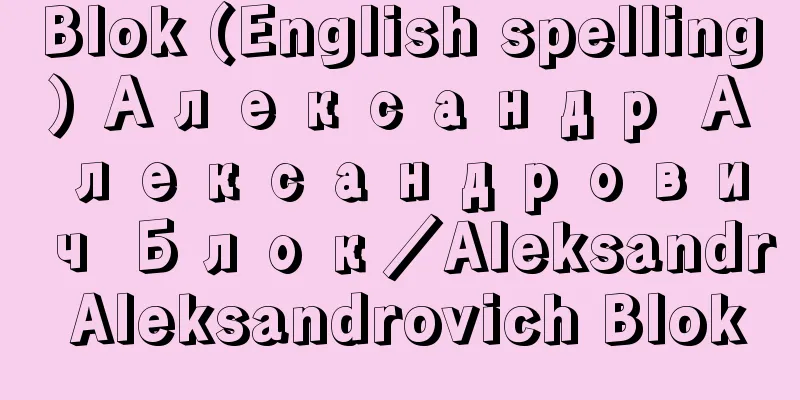Blok (English spelling) Александр Александрович Блок/Aleksandr Aleksandrovich Blok

|
A poet representing Russian Symbolism. His father was a professor of state law at the University of Warsaw, but his parents divorced shortly after Blok was born, so Blok was raised in his mother's house. His grandfather Beketov was a botanist and the rector of St. Petersburg University. His grandmother, mother, and mother's sisters were all well-educated in literature, so Blok grew up in an extremely privileged intellectual environment. He entered the law faculty of St. Petersburg University in 1898, then transferred to the literature faculty, graduating in eight years. He began to write poetry in earnest in 1897, after falling in love with an older woman. The following summer, he met Lyubov Mendeleeva, the daughter of chemist Mendeleev and who would later become his wife, and began to write poems that glorified and exalted her in the style of a courtly romance. Around the turn of the century, Blok began to look at the surrounding scenery and natural movements and tried to read some kind of sign in them, and the following year, under the influence of the poems of the philosopher Solovyov, this tendency became even more mystical. The first year of the 20th century was greeted by some young people with the expectation of the arrival of a renewed world and a transformation of the world. In other words, it was believed that the end of the world would come and the transformation of the world would begin with the appearance of Sophia (a woman who embodies perfect beauty and harmony, who acts as a mediator between this world and the heavenly world, between God and man) as Solovyov said. While walking through the towns and fields, Blok vividly saw visions of the mysterious woman. From the autumn of that year, the shadowy parts of the poem, such as the motif of self-conscious splitting and "doppelganger," became stronger, but the poems of "Beautiful Ladies," which included poems written between 1901 and 1902, are basically permeated with this mystical mood. Blok knew almost nothing of the new literature of his time, but around 1903 he began to become familiar with the works of the so-called decadent movement. He married in August 1903. This was the time when he woke up from his reverie. He turned his attention to the reality around him, and his poetry began to expand, incorporating various motifs. He sings of cityscapes, the lives of workers and the lower classes, the small animals and plants of the swamps, as well as the vast expanses of fields and land, and the 1905 revolution. However, from Blok's inner perspective, "awakening to reality" meant exposing his vulnerable soul to reality and searching for a way to create "beauty" from the pain and suffering. He wrote the poem "The Stranger" (1906), written during the time when he was involved in a love triangle with the poet Bely over his wife and wandering the city drunkenly, in which he dreams of a land of bliss after seeing a prostitute in a restaurant, and it was born from such a search. Blok also faced the problem of the relationship between the intelligentsia and the masses, the narods, and ultimately the future and fate of Russia. As Blok gained fame as a poet and developed his awareness as a poet, he was also opened to the problems of his time and had to face head-on the problems that were emerging in Russia at the beginning of the 20th century. In his epic poem about the revolution, "Twelve" (1918), he sees the revolution as an expression of the Narod spirit, and represents it through the 12 Red Army soldiers patrolling the streets in a snowstorm. In the first half of the poem, he praises their wild spirit, overlapping it with images of festive orgs and legends of righteous thieves. In the second half, in stark contrast, a vision of a beautiful, feminine Christ appears before the soldiers as they march solemnly. Blok presented the idea of self-sacrifice, in which an intellectual is willing to sacrifice himself for the cause of the revolution. Blok almost burned out from writing the poem, and soon passed away, suffering from symptoms of general weakness. [Takeshi Kodaira] "Broke's Poems, translated by Takeshi Kodaira (1979, Yayoi Shobo)" ▽ "The Rose and the Cross, translated by Takeshi Kodaira and Shigeo Washizu (1979, Shoshi Ringoya)" Source: Shogakukan Encyclopedia Nipponica About Encyclopedia Nipponica Information | Legend |
|
ロシア象徴主義を代表する詩人。父はワルシャワ大学の教授(国家法)であったが、ブロークが生まれてまもなく両親が離婚したので、ブロークは母方の家で育てられた。祖父ベケトフは植物学者でペテルブルグ大学の学長。祖母や母、母の姉妹たちはいずれも文学的素養が深く、ブロークはきわめて恵まれた知的環境のなかで育った。1898年ペテルブルグ大学法学部に入学、のち文学部に転じ、8年かかって卒業。詩を本格的に書き始めるのは1897年からで、年上の女性との恋がきっかけであった。さらに翌年の夏、化学者メンデレーエフの娘、後の夫人となるリュボーフィ・メンデレーエワとの出会いがあり、彼女を宮廷恋愛風に崇(あが)め高める詩が書かれ始める。1900年に入るころから、あたりの風景、自然の動きに見入りながら、そこになにものかの徴候を読み取ろうとする傾向がみえ始め、翌年には哲学者ソロビヨフの詩の影響もあって、それがさらに神秘化されていく。20世紀最初の1年目は一部青年たちによって、刷新された世界の到来、世界の変貌(へんぼう)への期待とともに迎えられた。すなわちそれは、ソロビヨフのいうソフィア(この世と天上の世界、神と人の仲立ちとなる、完全なる美と調和を体現した女性)の顕現とともに、この世の終末が訪れ、世界の変貌が始まる、と考えられたのである。ブロークは町や野を歩きながら、その神秘の女性の幻を如実にみていた。その年の秋からは自意識による分裂、「分身」のモチーフなど影の部分が濃くなってくるが、1901~02年の詩を収めた『うるわしの淑女』詩編は基本的にこのような神秘的気分に貫かれている。 ブロークはそのころまで同時代の新しい文学をほとんど知らなかったが、1903年ごろからいわゆるデカダン派の作品にも親しみ始める。03年8月に結婚。夢想からの覚醒(かくせい)の時期がくる。身の周りの現実に目が向けられ、ブロークの詩はさまざまなモチーフを取り入れて、膨らみだす。都市風景、労働者や下層民の生活、沼地の小動物や植物と並んで野や大地の広がりが、05年の革命が歌われる。しかし「現実への覚醒」とは、ブロークの内面の側からいうならば、傷つきやすい魂を現実にさらし、その痛みと苦難のなかから「美」を創(つく)りだす方途を探ることであった。夫人をめぐって詩人ベールイと三角関係に陥り、酒浸りになって街を彷徨(ほうこう)していたころに書かれた詩、レストランで見かけた娼婦(しょうふ)に至福の国を夢みる『見知らぬ女』(1906)は、そのような模索のなかから生まれた。さらにブロークの前には、知識人と大衆、ナロードとの関係の問題、ひいてはロシアの行く末、ロシアの運命が浮かび上がってくる。ブロークは詩人としての名声を博し、詩人としての自覚を深めるとともに、同時代の問題に目を開かれ、20世紀初頭のロシアに集中して現れてきた問題と全面的に直面しなければならなかった。 革命を描いた叙事詩『十二』(1918)は、革命をナロードのスピリットの発現とみて、吹雪(ふぶき)の街をパトロールする12人の赤軍兵士にそれを代表させ、前半では祝祭のオルギーや義賊伝説のイメージと重ね合わせながら、その荒ぶる魂をことほぐ。後半では、うって変わって厳粛に行進する兵士の行く手に、女性にまがう美しさのキリストの幻が現れる。ブロークは、革命の大義の前に知識人たる自らが滅び去ることもあえてうべなう自己犠牲のイデーを示したのであった。ブロークはその詩を書くことによってほとんど燃え尽きたように、まもなく全身衰弱のような症状を呈して世を去った。 [小平 武] 『小平武訳『ブローク詩集』(1979・弥生書房)』▽『小平武・鷲巣繁男訳『薔薇と十字架』(1979・書肆林檎屋)』 出典 小学館 日本大百科全書(ニッポニカ)日本大百科全書(ニッポニカ)について 情報 | 凡例 |
Recommend
Sarzec, E.de (English spelling) SarzecEde
...Because the Assyrian alphabet uses complex log...
Ranunculus acer (English spelling) Ranunculusacer
…[Michio Tamura]. … *Some of the terminology that...
Sanada [town] - Sanada
A former town in Chiisagata County, bordering Ueda...
Kariya
...Ako Castle remains only in the form of stone w...
Dosso Dossi (English spelling)
Around 1490 - 1542 Italian painter. His real name ...
Castel Sant'Angelo - Castel Sant'Angelo
A circular fortress on the right bank of the Tiber...
Monthly loan money - Gesshakusen
A type of usury practiced by central government of...
Coupon - Kinken
A certificate that substitutes for currency. Ther...
Red Admiral (English spelling) redadmiral
...The larvae feed on the leaves of plants in the...
Oshima Peninsula - Oshima Peninsula
A peninsula in southwestern Hokkaido. The area is...
Kimyochourai - A tribute to the deceased
To take refuge in a Buddha or Bodhisattva. Taking...
Stone slab
〘Noun〙 (also "sekihan") A printing metho...
Tasmanian devil
It is an animal of the Marsupial order of Mammali...
Lin Ling sù (English spelling)
?‐1119 A Taoist priest from the end of the Norther...
Clements, Frederic Edward
Born September 16, 1874 in Lincoln, Nebraska Died ...









